|
Arguing about sports is forever a growth industry. But we in the college football universe have proven ourselves standouts in this regard: We don't ever have to even change what we're yelling about! The "playoff or no playoff?" debate raged for almost 50 years, from the mid-1960s to the early 2010s, and when we finally got one, we immediately began debating about playoff expansion. The "super league breakaway" debate that has picked up steam lately? We've been talking about that one since the 1970s, when the Alabamas and Oklahomas of the world got annoyed about having the same NCAA Division I voting power as the Ionas and Mercers. Conference realignment? Conferences have been realigning since conferences first became a thing, but rumors and power moves have been in fifth gear for basically 35-45 years now. All in all, the player compensation debate is still in its early stages: We've only been arguing about it for, what, 15-20 years? Year after year, decade after decade, we fight on. A playoff will ruin the integrity of the regular season! And what about the bowls? A super league is right around the corner! People will stop watching if the players are getting paid! Mizzou's going to land that Big Ten invitation any day now! (Hey, don't scoff at that last one. It wouldn't be the craziest thing that league has done in the last few years.) Since multiverses are all the rage these days, let's hop over into an alternate universe where, 60 years ago, college football magically did something progressive. Let's pretend for a moment Duffy Daugherty's lobbying for an eight-team playoff, with six conference champions and the top two independents (or, theoretically, champions of other conferences), actually worked. Daugherty's plan was to leave the bowls alone and finish the entire playoff over three weeks in December. Let's have fun with that idea: Let's say the quarterfinals and semifinals are on campus, and, to placate the Rose Bowl -- and get it to agree to this whole thing -- the finals are always in Pasadena. Conveniently, we'll say this entire thing starts in time for the 1966 season, which had one of the most controversial finishes on record. For each season starting with 1966, I'm going to simulate an eight-team playoff using historic SP+ rankings. Instead of just picking the favorite to win each game, I'm going to go full ESPN Analytics style and pick a random simulation from 10,000 to determine what would have happened in a given playoff. For the more controversial seasons in college football's recent history, we'll do more of a deep dive on how things might have played out with a playoff in place. (Note: The first rule of proper What If-ing is that you only twist one segment of history at a time. Isolate your variables and whatnot. An actual playoff coming to fruition in the mid-1960s would have inevitably created countless butterfly effects regarding which programs rise to power and which coaches go where. It probably changes future conference realignment scenarios, too. And I'm not sure conference championship games would have come about in the 1990s if, by this point, we had an expanded playoff. In other words, it changes everything. But we're going to keep team quality, coach history, conference rosters, et cetera, as they were and focus only on the results of a playoff.)
 1966: About that tie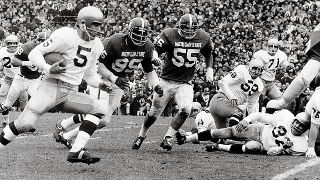 This, of course, is the famous season in which defending national champion Alabama went unbeaten but finished behind both Notre Dame and Michigan State, which tied each other in late November. Notre Dame secured the title, but all three teams had a strong claim to it. Seems like a great year for a playoff to me!  Quarterfinals: Clemson (6-4) at No. 1 Notre Dame (9-0-1), No. 8 Georgia Tech (9-1) at No. 6 Nebraska (9-1), No. 10 SMU (8-2) at No. 3 Alabama (9-0), USC (7-3) at No. 2 Michigan State (9-0-1). Title odds (per SP+): Notre Dame 46%, Alabama 27%, Michigan State 20%, Georgia Tech 3%, Nebraska 2%, USC 1%, SMU 0.4%, Clemson <0.1%. Here's the randomly selected simulation: Quarterfinals: No. 1 Notre Dame over Clemson, No. 6 Nebraska over No. 8 Georgia Tech, No. 3 Alabama over No. 10 SMU, USC over No. 2 Michigan State. Semifinals: No. 1 Notre Dame over No. 6 Nebraska, No. 3 Alabama over USC. Finals: No. 1 Notre Dame over No. 3 Alabama. Notre Dame still wins the title, and Alabama fans are no longer cranky about how this played out. Everybody wins!
1967: No. 5 Notre Dame over No. 6 Wyoming. 1968: No. 3 Penn State over No. 1 Ohio State. 1969: No Nixon neededTexas won the 1969 national title, at least in part, because of Richard Nixon. ABC convinced preseason No. 2 Arkansas and No. 4 Texas to move their hyped game to the end of the season, and both were unbeaten when they played in Fayetteville on Dec. 6. President Nixon attended the game and, after Texas' incredible 15-14 comeback win, declared the Longhorns the national champion after the game. This was news to Joe Paterno and unbeaten No. 2 Penn State. Again: A playoff would have been useful.  (Also, because of the early lack of success for the ACC, which really didn't start looking like a major conference until the late 1970s at the earliest, we'll say that bids now go to the six highest-ranked conference champions instead of the champs of six specific conferences.) Quarterfinals: No. 20 Toledo (10-0) at No. 1 Texas (10-0), No. 9 Notre Dame (8-1-1) at No. 6 Missouri (9-1), No. 7 Michigan (8-2) at No. 5 USC (9-0-1), No. 11 Tennessee (9-1) at No. 2 Penn State (10-0). 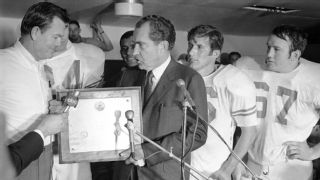 Title odds: Texas 25%, Penn State 18%, Missouri 14%, Tennessee 12%, Michigan 11%, USC 8%, Notre Dame 7%, Toledo 5%. Here's the random simulation: Quarterfinals: No. 1 Texas over No. 20 Toledo, No. 6 Missouri over No. 9 Notre Dame, No. 7 Michigan over No. 5 USC, No. 2 Penn State over No. 11 Tennessee. Semifinals: No. 1 Texas over No. 6 Missouri, No. 7 Michigan over No. 2 Penn State. Finals: No. 1 Texas over No. 7 Michigan. The Longhorns indeed still win the title over Bo Schembechler's late-peaking Wolverines.
1970: No. 2 Ohio State over No. 5 LSU. 1971: No. 1 Nebraska over No. 2 Alabama. 1972: No. 1 USC over No. 9 Nebraska. 1973: No. 1 Alabama over No. 4 Ohio State. (Since Oklahoma was banned from the postseason in 1973-74, we'll say they were banned from the playoffs too. Makes sense.) 1974: No. 10 Miami (Ohio) over No. 2 USC. Yes! I was hoping we would have at least one Cinderella, and Miami, 12th overall in SP+, was a particularly strong candidate, especially with Oklahoma, by far the best team of 1974, still banned. 1975: No. 1 Ohio State over No. 11 UCLA. Around this period, a decade into an almost assuredly successful playoff, a dilemma would undoubtedly be bubbling to the surface. Teams like Michigan and either Nebraska or Oklahoma were missing out on the playoff on an annual basis thanks to the "conference champs or indies only" rule, and said rule was letting in a lot of independents ranked in the double digits. Granted, this was great for bowl games that were still able to rope in some big brands not affiliated with the playoff, the talk of expanding the field to nonchampions would have grown, especially considering the men's NCAA basketball tournament expanded from 25 teams to 32 to include at-large bids beginning in 1974-75. We'll say the debate lasts a couple of years, and this new progressive NCAA agrees to expand to 12 teams -- six conference champions, plus the six highest-ranked at-large teams -- in 1979 (the year the NCAA tournament expanded to 40). 1976: No. 1 Pitt over No. 3 USC. 1977: No. 8 Penn State over No. 5 Notre Dame. 1978: A Cinderella instead of a split titleAnother year with a classic split title. Yet another year that would have been perfect for a playoff, especially an eight-teamer. Heading into bowl season, top-ranked Penn State was the only 11-0 team, but we had one-loss teams ranked second (Alabama), third (USC), fourth (Oklahoma), fifth (Michigan) and seventh (Clemson). PSU went to the Sugar Bowl to play, and lose to, Bama, while USC outlasted No. 5 Michigan in the Rose Bowl to snag a split title. As you see from the title odds below, there was no single standout team in 1978, and six would have entered the playoff with a solid title shot.  Quarterfinals: No. 12 Michigan State (8-3) at No. 1 Penn State (11-0), No. 7 Clemson (10-1) at No. 6 Nebraska (9-2), No. 9 Houston (9-2) at No. 3 USC (11-1), No. 10 Notre Dame (8-3) at No. 2 Alabama (10-1). (Michigan State scored the Big Ten's autobid because of a head-to-head win over No. 5 Michigan and an equal conference record.) Title odds: USC 23%, Alabama 21%, Nebraska 15%, Penn State 14%, Clemson 11%, Michigan State 11%, Notre Dame 4%, Houston 3%. Here's the random simulation. It's a delight: Quarterfinals: No. 12 Michigan State over No. 1 Penn State, No. 7 Clemson over No. 6 Nebraska, No. 9 Houston over No. 3 USC, No. 10 Notre Dame over No. 2 Alabama. Four road wins! Told you it was a balanced year. Semifinals: Clemson over Michigan State, Houston over Notre Dame. Finals: Clemson over Houston. Cinderella No. 1 beats Cinderella No. 2 to finish the final eight-team playoff.
1979: No. 5 Oklahoma over No. 2 Alabama. 1980: Herschel Walker doesn't run away with a titleThis season didn't produce a great controversy -- Georgia was the only unbeaten team and therefore won the national title. But to me, this has always been a year when the bowl selection process grew particularly untrustworthy when it came to producing a champion. Georgia beat No. 7 Notre Dame in the Sugar Bowl to secure the title; the Fighting Irish were the Dawgs' only opponent ranked higher than 14th all season. There were a number of dynamite teams this season (Pitt, Florida State, Penn State, even Alabama), and Georgia, eighth in SP+ for the season, played none of them. In an alternate universe with now a 12-team playoff, the road gets a lot bumpier.  First round: No. 9 Alabama (9-2) at No. 8 Nebraska (9-2), No. 14 BYU (11-1) at No. 5 Michigan (9-2), No. 13 North Carolina (10-1) at No. 6 Baylor (10-1), No. 10 Penn State (9-2) at No. 7 Notre Dame (9-1-1). Quarterfinals: Alabama/Nebraska at No. 1 Georgia (11-0), BYU/Michigan at No. 4 Oklahoma (9-2), UNC/Baylor at No. 3 Pitt (10-1), Penn State/Notre Dame at No. 2 Florida State (10-1). Title odds: Pitt 27%, Florida State 21%, Nebraska 20%, Oklahoma 8%, Alabama 7%, Georgia 6%, Michigan 5%, Penn State 4%, Notre Dame 2%, North Carolina 1%, Baylor 0.8%, BYU 0.5%. Here's the random simulation: First round: No. 8 Nebraska over No. 9 Alabama, No. 5 Michigan over No. 12 BYU, No. 6 Baylor over No. 13 UNC, No. 10 Penn State over No. 7 Notre Dame. Quarterfinals: No. 8 Nebraska over No. 1 Georgia, No. 4 Oklahoma over No. 5 Michigan, No. 3 Pitt over No. 6 Baylor, No. 2 Florida State over No. 10 Penn State. Semifinals: No. 4 Oklahoma over No. 8 Nebraska, No. 3 Pitt over No. 2 Florida State. Finals: No. 4 Oklahoma over No. 3 Pitt.
1981: No. 1 Clemson over No. 2 Georgia. 1982: No. 1 Georgia over No. 3 Nebraska. Honestly? A much more sensible story arc for the Herschel Walker Georgia teams. In real life, the worst of the three won the title, while the two others came up just short. In this reality? Incremental improvement and a final breakthrough. 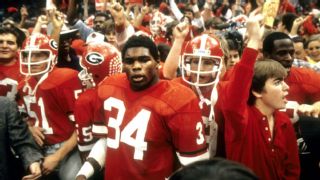 1983: No. 5 Miami over No. 6 SMU. Did I cheat and find a simulation that had Miami beating Nebraska in the semifinals to retain The U's origin story? Yes. Did it create the greatest set of late-round results ever (SMU over Texas and Miami over Nebraska in the semis, The U over Pony Excess in the finals)? Also yes.
1984: Making BYU earn itThis season was controversial in a different way. There were no split titles, and the only unbeaten team won the title, but that team was the WAC's BYU. LaVell Edwards' Cougars had won plenty of games in recent seasons, and they began 1984 with a win at No. 3 Pitt, but the Panthers ended up plummeting to 3-7-1, and BYU beat no other ranked opponents. The Cougars then had to come back to beat 6-5 Michigan despite countless turnovers in the Holiday Bowl. Since No. 2 Oklahoma lost to No. 4 Washington in the Orange Bowl and No. 3 Florida was banned from the postseason, that was enough for BYU to barely earn more votes than UW.  Were the Cougars deserving? Sure! They were fourth in SP+, and the teams above them all had blemishes. They would have absolutely had a shot in this 12-team playoff. But Washington and a dominant (but two-loss) Nebraska would have entered as the favorites.  First round: No. 10 SMU (9-2) at No. 9 Oklahoma State (10-2), No. 18 USC (8-3) at No. 6 Ohio State (9-2), No. 12 Maryland (9-3) at No. 7 South Carolina (10-2), No. 11 LSU (8-2-1) at No. 8 Boston College (9-2). Quarterfinals: SMU/OSU at No. 1 BYU (12-0), USC/Ohio State at No. 5 Nebraska (9-2), Maryland/SC at No. 4 Washington (10-1), LSU/BC at No. 2 Oklahoma (9-1-1). Title odds: Nebraska 33%, Washington 25%, BYU 13%, Oklahoma 10%, Ohio State 5%, Oklahoma State 5%, Boston College 3%, SMU 3%, LSU 2%, Maryland 2%, South Carolina 1%, USC 0.2%. Here's the random simulation: First round: No. 9 Oklahoma State over No. 10 SMU, No. 6 Ohio State over No. 18 USC, No. 12 Maryland over No. 7 South Carolina, No. 8 BC over No. 11 LSU. Quarterfinals: No. 1 BYU over No. 9 Oklahoma State, No. 5 Nebraska over No. 6 Ohio State, No. 4 Washington over No. 12 Maryland, No. 8 BC over No. 2 Oklahoma. Semifinals: No. 1 BYU over No. 5 Nebraska, No. 4 Washington over No. 8 BC. Finals: No. 4 Washington over No. 1 BYU.
1985: No. 3 Oklahoma over No. 13 UCLA. 1986: No. 7 Arizona State over No. 1 Miami. Hey, if I cheated and found a Miami win in 1983, I had to do the same to find a loss in 1986. Only, here it's John Cooper's excellent Sun Devils (sixth in SP+) doing the deed after upsetting No. 2 Penn State in the quarterfinals. 1987: No. 2 Miami over No. 5 Nebraska. 1988: No. 2 Miami over No. 1 Notre Dame in a Catholics vs. Convicts rematch that draws better ratings than the Super Bowl. 1989: No. 2 Miami over No. 4 Notre Dame. A Hurricanes three-peat. Here's where we acknowledge the specter of further bracket creep. The NCAA tournament expanded to 64 teams in 1985, and it was a rousing success. And with some absolutely spectacular late-1980s football playoffs here (plus the financial issues that hit many athletic programs in the late 1980s), it's an absolute guarantee that the football playoff expands at some point. Conveniently, we'll say the first year of a 16-team field comes in 1990, source of another controversial split title in real life. Because mid-majors were randomly faring pretty well in this tournament (and because Cinderella stories were a huge part of the allure of the NCAA tournament), we'll say that eight champions are guaranteed entry into the field, with eight at-large bids filling in the rest. 1990: The U trumps obtuse bowl dramaOnce again, the bowls let us down dramatically in 1990. With unbeaten Virginia rising to No. 1 in early November, the Sugar Bowl worked to get an informal commitment from the Cavaliers. They then proceeded to collapse while ACC mate Georgia Tech surged to No. 2. The unranked Cavaliers then played Tennessee in New Orleans while Tech settled for a Citrus Bowl bid against No. 18 Nebraska. They won, while No. 1 Colorado edged past No. 5 Notre Dame, and the two split the title. Say it with me now: Seems like a great year for a playoff! 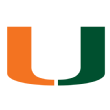 First Round: San Jose State (8-2-1) at No. 1 Colorado (10-1-1), No. 10 Tennessee (8-2-2) at No. 8 Washington (9-2), No. 14 Clemson (9-2) at No. 5 Notre Dame (9-2), No. 15 Ole Miss (9-2) at No. 4 Miami (9-2), No. 13 BYU (10-2) at No. 6 Florida State (9-2), No. 16 Illinois (8-3) at No. 3 Texas (10-1), No. 12 Michigan (8-3) at No. 7 Penn State (9-2), No. 17 Iowa (8-3) at No. 2 Georgia Tech (10-0-1). (No. 9 Houston and No. 11 Florida were both banned from the postseason.) Title odds: Florida State 27%, Miami 24%, Georgia Tech 11%, Clemson 9%, Colorado 8%, Washington 8%, Michigan 5%, Penn State 3%, Tennessee 3%, Notre Dame 3%, Texas 1%, BYU 0.3%, Iowa 0.3%, Illinois 0.2%, SJSU <0.05%, Ole Miss <0.05%. FSU and Miami were easily the two highest-rated teams this season (and most seasons at this time). Here's the random simulation: First round: No. 1 Colorado over SJSU, No. 10 Tennessee over No. 8 Washington, No. 5 Notre Dame over No. 14 Clemson, No. 4 Miami over No. 15 Ole Miss, No. 6 FSU over No. 13 BYU, No. 16 Illinois over No. 3 Texas, No. 12 Michigan over No. 7 PSU, No. 2 Georgia Tech over No. 17 Iowa. Quarterfinals: No. 1 Colorado over No. 10 Tennessee, No. 4 Miami over No. 5 Notre Dame, No. 6 FSU over No. 16 Illinois, No. 2 Georgia Tech over No. 12 Michigan. Semifinals: No. 4 Miami over No. 1 Colorado, No. 2 Georgia Tech over No. 6 FSU. Finals: No. 1 Miami over No. 2 Georgia Tech. A FOUR-PEAT FOR THE U.
1991: Washington doesn't have to shareIn real life, we got back-to-back split titles as two brilliant and unbeaten teams, Miami and Washington, played bowls on opposite coasts. Could they run the table and meet for the title in a universe with a huge playoff? Nope! First round: BYU (8-3-1) at No. 1 Miami (11-0), No. 9 Texas A&M (10-1) at No. 8 Alabama (10-1), No. 12 East Carolina (10-1) at No. 5 Florida State (10-2), No. 13 Clemson (9-1-1) at No. 4 Michigan (10-1), No. 11 Nebraska (9-1-1) at No. 6 Penn State (10-2), No. 14 Cal (9-2) at No. 3 Florida (10-1), No. 10 Tennessee (9-2) at No. 7 Iowa (10-1), No. 15 Colorado (8-2-1) at No. 2 Washington (11-0).  Title odds: Washington 39%, Florida State 17%, Miami 17%, Penn State 10%, Texas A&M 5%, Florida 5%, Michigan 3%, California 2%, Nebraska 1%, Alabama 1%, Iowa 1%, Tennessee 0.4%, Colorado 0.4%, Clemson 0.3%, ECU <0.05%, BYU <0.05%. SP+ loved this Washington team, while Miami's overall quality didn't quite match the record. Here's the random simulation: First round: No. 1 Miami over BYU, No. 9 Texas A&M over No. 8 Alabama, No. 5 FSU over No. 12 ECU, No. 4 Michigan over No. 13 Clemson, No. 11 Nebraska over No. 6 Penn State, No. 3 Florida over No. 14 Cal, No. 7 Iowa over No. 10 Tennessee, No. 2 Washington over No. 15 Colorado. Quarterfinals: No. 9 Texas A&M over No. 1 Miami (the title streak is over!), No. 5 FSU over No. 4 Michigan, No. 11 Nebraska over No. 3 Florida, No. 2 Washington over No. 7 Iowa. Semifinals: No. 5 FSU over No. 9 Texas A&M, No. 2 Washington over No. 11 Nebraska. Finals: No. 2 Washington over No. 5 FSU.
1992: No. 2 Alabama over No. 1 Miami. 1993: The Irish still don't overcome the SeminolesAnother controversial finish. Notre Dame beat top-ranked Florida State late in the season, but the very next week, the Irish were upset by Boston College and gave the No. 1 ranking back to the Seminoles. FSU beat Florida and Nebraska to finish the season and held on to win the title over No. 2 Notre Dame despite the head-to-head loss. This was exceedingly fair, but Lou Holtz didn't like it much. Once again: It seems like a perfect time for a playoff!  First round: No. 25 Fresno State (8-3) at No. 1 Florida State (11-1), No. 10 Miami (9-2) at No. 9 Wisconsin (9-1-1), No. 13 Penn State (9-2) at No. 6 Tennessee (9-1-1), No. 14 UCLA (8-3) at No. 4 Notre Dame (10-1), No. 12 North Carolina (10-2) at No. 7 Texas A&M (10-1), No. 15 Boston College (8-3) at No. 3 West Virginia (11-0), No. 11 Ohio State (9-1-1) at No. 8 Florida (10-2), No. 16 Arizona (9-2) at No. 2 Nebraska (11-0). (No. 5 Auburn was banned from the postseason.) Title odds: FSU 30%, Florida 16%, Tennessee 16%, Texas A&M 11%, Notre Dame 9%, Nebraska 5%, Arizona 2%, Wisconsin 2%, West Virginia 2%, Penn State 2%, Miami 2%, Boston College 1%, Ohio State 1%, UCLA 1%, North Carolina 1%, Fresno State 0.1%. Simulation time: First round: No. 1 Florida State over No. 25 Fresno State, No. 9 Wisconsin over No. 10 Miami, No. 6 Tennessee over No. 13 Penn State, No. 4 Notre Dame over No. 14 UCLA, No. 7 Texas A&M over No. 12 UNC, No. 15 BC over No. 3 WVU, No. 11 Ohio State over No. 8 Florida, No. 16 Arizona over No. 2 Nebraska. Upsets galore! Quarterfinals: No. 1 FSU over No. 9 Wisconsin, No. 4 Notre Dame over No. 6 Tennessee, No. 15 BC over No. 7 Texas A&M, No. 11 Ohio State over No. 16 Arizona. Semifinals: No. 1 FSU over No. 4 Notre Dame, No. 11 Ohio State over No. 15 BC. Finals: No. 1 FSU over No. 11 Ohio State. Boston College's upset of Notre Dame scores the Eagles a playoff bid, and they proceed to make a big run. But in the end, Bobby Bowden still wins his first title.
1994: No. 2 Penn State over No. 9 Auburn. 1995: No. 1 Nebraska over No. 10 Kansas State. 1996: No. 4 Ohio State over No. 6 Nebraska. John Cooper scores his second national title at two different schools. Let that sink in for a moment. 1997: Peyton Manning actually wins something in college This season produced the last split title of the pre-BCS era, as both Michigan and Nebraska reached the finish line unbeaten. Neither team was incredibly dominant, though, and with a 16-team playoff, at least half the field would have had a glimmer of a chance. Sounds like a great year for a playoff to me! And it produced what is one of my favorite simulations. You get rivalry upsets in the quarterfinals, and after a bitter, tight Heisman race that went against him, Peyton Manning gets the last laugh in a wild season.  First round: No. 22 Southern Miss (8-3) at No. 1 Michigan (11-0), No. 9 Ohio State (10-2) at No. 8 Washington State (10-1), No. 12 Georgia (9-2) at No. 5 UCLA (9-2), No. 13 Auburn (9-3) at No. 4 Florida State (10-1), No. 11 Penn State (9-2) at No. 6 Florida (9-2), No. 14 Syracuse (9-3) at No. 3 Tennessee (11-1), No. 10 Kansas State (10-1) at No. 7 North Carolina (10-1), No. 18 Colorado State (10-2) at No. 2 Nebraska (12-0). Title odds: Nebraska 18%, FSU 17%, Florida 13%, UCLA 9%, Tennessee 8%, Michigan 7%, North Carolina 7%, Ohio State 6%, Georgia 4%, Kansas State 4%, Wazzu 3%, Syracuse 2%, Auburn 2%, Penn State 0.4%, Colorado State 0.4%, Southern Miss 0.1%. Simulation time: First round: No. 1 Michigan over No. 22 Southern Miss, No. 9 Ohio State over No. 8 Wazzu, No. 5 UCLA over No. 12 Georgia, No. 13 Auburn over No. 4 FSU, No. 11 PSU over No. 6 Florida, No. 3 Tennessee over No. 14 Syracuse, No. 10 Kansas State over No. 7 North Carolina, No. 2 Nebraska over No. 18 CSU. Quarterfinals: No. 9 Ohio State over No. 1 Michigan, No. 5 UCLA over No. 13 Auburn, No. 3 Tennessee over No. 11 PSU, No. 10 Kansas State over No. 2 Nebraska. Semifinals: No. 9 Ohio State over No. 5 UCLA, No. 3 Tennessee over No. 10 Kansas State. Finals: No. 3 Tennessee over No. 9 Ohio State.
1998: No. 3 Ohio State over No. 4 Kansas State. Three-time champion John Cooper, two-time runner-up Bill Snyder. 1999: No. 6 Kansas State over No. 1 Florida State. Snyder gets his title. 2000: No. 1 Oklahoma over No. 3 Miami. 2001: No. 1 Miami over No. 2 Nebraska. 2002: No. 8 Kansas State over No. 3 Georgia! The random number generator evidently loves Bill Snyder. 2003: Chris Rix, agent of chaosEven the BCS produced a split national title in 2003, when there were three nearly equal, one-loss teams atop the rankings and only two could play in the title game. LSU beat Oklahoma, USC won the Rose Bowl, and once again we ended up with two champs. With a big group of six two-loss teams trailing the top three teams, plus a particularly awesome mid-major in Ben Roethlisberger's Miami (Ohio), this would have been a ferocious 16-teamer.  First round: No. 17 Boise State (12-1) at No. 1 Oklahoma (12-1), No. 9 Miami (10-2) at No. 8 Tennessee (10-2), No. 12 Georgia (10-3) at No. 5 Ohio State (10-2), No. 13 Iowa (9-3) at No. 4 Michigan (10-2), No. 11 Miami (Ohio) (12-1) at No. 6 Texas (10-2), No. 14 Purdue (9-3) at No. 3 USC (11-1), No. 10 Kansas State (11-3) at No. 7 Florida State (10-2), No. 15 Florida (8-4) at No. 2 LSU (12-1). 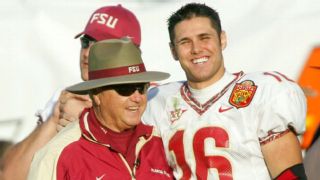 Title odds: LSU 22%, Oklahoma 20%, USC 13%, Georgia 9%, Kansas State 7%, Michigan 7%, Texas 7%, FSU 4%, Miami 3%, Iowa 2%, Tennessee 1%, Ohio State 1%, Purdue 1%, Miami (Ohio) 0.5%, Florida 0.5%, Boise State 0.3% Simulation! First round: No. 1 Oklahoma over No. 17 Boise State, No. 9 Miami over No. 8 Tennessee, No. 5 Ohio State over No. 12 Georgia, No. 4 Michigan over No. 13 Iowa, No. 11 Miami (Ohio) over No. 6 Texas, No. 14 Purdue over No. 3 USC, No. 7 Florida State over No. 10 Kansas State, No. 2 LSU over No. 15 Florida. Quarterfinal: No. 9 Miami over No. 1 Oklahoma, No. 4 Michigan over No. 5 Ohio State, No. 11 Miami (Ohio) over No. 14 Purdue, No. 7 Florida State over No. 2 LSU. Semifinals: No. 4 Michigan over No. 9 Miami, No. 7 Florida State over No. 11 Miami (Ohio). Finals: No. 7 Florida State over No. 4 Michigan. I love this. FSU was involved in every playoff going back to 1987 but won only one. Then, as the Bowden era begins to slip, Chris Rix and company go on a miraculous run to a second FSU title.
2004: No. 1 USC over No. 2 Oklahoma. Unbeaten Auburn gets its shot in this universe but gets upset by Miami in the first round. 2005: No. 2 Texas over No. 1 USC. It is canon. 2006: No. 6 Louisville over No. 4 LSU. Bobby Petrino: national champion. 2007: No. 9 West Virginia over No. 6 Missouri. The most delirious regular season of all time was guaranteed to produce a delirious playoff, but I wasn't prepared for this: No. 1 Ohio State (against No. 17 BYU), No. 2 LSU (against No. 15 Clemson) and No. 3 Virginia Tech (against No. 14 Boston College) all fall in the first round, leaving an absolute free-for-all and semifinals of No. 9 WVU over No. 5 Georgia and No. 6 Mizzou over No. 7 USC. Glorious. 2008: No. 5 USC over No. 3 Texas. Revenge for 2005. 2009: No. 2 Texas over No. 6 Boise State. 2010: No. 4 Stanford over No. 2 Oregon. Andrew Luck outduels Cam Newton in the semifinals, the Cardinal avenge their only loss of the season in the finals, and head coach Jim Harbaugh heads off to the NFL with a national title. (That last part seems familiar for some reason.) 2011: Wait, we still get Alabama-LSU?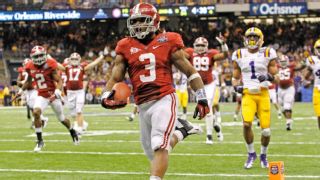 This is the rematch that convinced even the most stubborn and conservative decision-makers that a playoff was a good idea. Alabama eked out the No. 2 spot in the BCS rankings over explosive Oklahoma State, depriving us of a matchup between the best passing game in the country (OSU's) and the best secondary (LSU's). Not surprisingly, Mike Gundy said that would have worked in his Cowboys' favor, and while SP+ disagrees, it stinks that they didn't get a shot. It seems like it would have been a good year for a playoff! 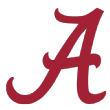 First round: No. 23 West Virginia at No. 1 LSU, No. 9 South Carolina at No. 8 Kansas State, No. 12 Baylor at No. 5 Oregon, No. 15 Clemson at No. 4 Stanford, No. 11 Virginia Tech at No. 6 Arkansas, No. 18 TCU at No. 3 Oklahoma State, No. 10 Wisconsin at No. 7 Boise State, No. 21 Southern Miss at No. 2 Alabama. Title odds: LSU 34%, Alabama 27%, Oklahoma State 9%, Oregon 7%, Stanford 7%, Arkansas 5%, Boise State 4%, Wisconsin 4%, South Carolina 1%, TCU 1%, Baylor 0.2%, Kansas State 0.2%, Virginia Tech 0.1%, West Virginia 0.1%, Clemson <0.05%, Southern Miss <0.05%. Simulation time: First round: No. 1 LSU over No. 23 West Virginia, No. 9 South Carolina over No. 8 Kansas State, No. 5 Oregon over No. 12 Baylor, No. 4 Stanford over No. 15 Clemson, No. 11 Virginia Tech over No. 6 Arkansas, No. 18 TCU over No. 3 Oklahoma State (ouch), No. 7 Boise State over No. 10 Wisconsin, No. 2 Alabama over No. 21 Southern Miss. Quarterfinals: No. 1 LSU over No. 9 South Carolina, No. 5 Oregon over No. 4 Stanford, No. 11 Virginia Tech over No. 18 TCU, No. 2 Alabama over No. 7 Boise State. Semifinals: No. 1 LSU over No. 5 Oregon, No. 2 Alabama over No. 11 Virginia Tech. Finals: No. 2 Alabama over No. 1 LSU. In this reality, this is Nick Saban's first title. He'll make up for lost time soon enough.
2012: No. 2 Alabama over No. 4 Oregon. It should be noted that the FCS playoffs expanded from 16 to 20 teams in 2010, then 24 in 2013. It is quite conceivable that, in this universe, the same thing might have happened at the FBS level. But we'll stick with 16 here. 2013: No. 1 Florida State over No. 10 Oregon. Ouch. The Ducks lose three title games in four years. 2014: No. 1 Alabama over No. 6 TCU. 2015: No. 12 Ole Miss over No. 3 Michigan State! This might be my favorite simulation of the whole exercise. Clemson (to Notre Dame) and Alabama (to Ohio State) both lose in the quarterfinals, and all hell breaks loose. Who was built for chaos? Chad Kelly and the Ole Miss Rebels, that's who. 2016: No. 1 Clemson over No. 5 Penn State. 2017: No. 4 Alabama over No. 3 Georgia. 2018: No. 1 Alabama over No. 6 Ohio State. 2019: No. 1 LSU over No. 2 Ohio State. 2020: No. 1 Alabama over No. 6 Oklahoma. And just like that, Saban is at six Bama titles in this reality too. 2021: No. 3 Georgia over No. 1 Alabama. 2022: No. 1 Georgia over No. 2 Michigan. 2023: No controversy, familiar finish Georgia entered the real 2023 aiming to become the first team to three-peat since the 1930s, but a single poor performance, in the SEC championship game against Alabama, deprived it of the chance. In our alternate reality, (A) Miami four-peated in the 1980s, and (B) a single loss doesn't knock you out. There were two standout teams in 2023: Michigan and the Dawgs. Guess who makes the finals in this reality.  First round: Troy (11-2) at No. 1 Michigan (13-0), No. 9 Missouri (10-2) at No. 8 Oregon (11-2), No. 12 Oklahoma (10-2) at No. 5 Florida State (13-0), No. 13 LSU (9-3) at No. 4 Alabama (12-1), No. 11 Ole Miss (10-2) at No. 6 Georgia (12-1), No. 23 Liberty (13-0) at No. 3 Texas (12-1), No. 10 Penn State (10-2) at No. 7 Ohio State (11-1), No. 24 SMU (11-2) at No. 2 Washington (13-0). Title odds: Michigan 26%, Georgia 25%, Oregon 10%, Ohio State 10%, Texas 7%, Alabama 7%, Penn State 5%, FSU 3%, LSU 2%, Washington 2%, Missouri 2%, Ole Miss 1%, Oklahoma 1%, SMU 0.2%, Troy 0.1%, Liberty 0.1%. Here's the simulation. First round: No. 1 Michigan over Troy, No. 9 Missouri over No. 8 Oregon, No. 5 Florida State over No. 12 Oklahoma, No. 13 LSU over No. 4 Alabama, No. 6 Georgia over No. 11 Ole Miss, No. 3 Texas over No. 23 Liberty, No. 7 Ohio State over No. 10 Penn State, No. 2 Washington over No. 24 SMU. Quarterfinals: No. 1 Michigan over No. 9 Missouri, No. 13 LSU over No. 5 Florida State, No. 6 Georgia over No. 3 Texas, No. 2 Washington over No. 7 Ohio State. Semifinals: No. 1 Michigan over No. 13 LSU, No. 6 Georgia over No. 2 Washington. Finals: No. 6 Georgia over No. 1 Michigan. The Dawgs three-peat, and we enter 2024 with Bama and UGA having won nine of the past 13 titles. Some things don't change no matter how you determine your champ.
|

